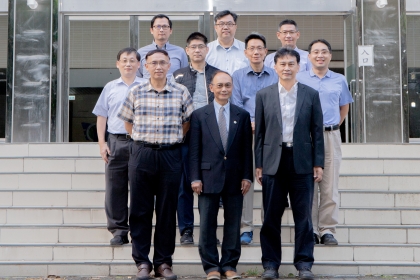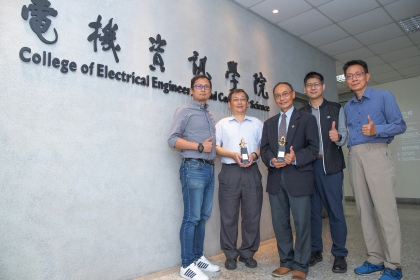National Chung Hsing University College of Electrical Engineering and Computer Science Wins 2021 Future Technology Award by Moonshot Project
2022-01-17 14:45:35
興新聞張貼者
Unit秘書室
2,088
Taiwan’s semiconductor development is leading in the world. In order to reach the goal of transforming Taiwan into an AI power in 2022, Ministry of Science and Technology initiated the "Semiconductor Moonshot Project" in 2018. The research teams from the college of electrical engineering and computer in NCHU science the project since then and won the 2021 Future Technology Awards under the category “Semiconductor AI Edge Core Technology Competitiveness” The awarded technologies include "Expandable and Modularized AI Hardware Accelerator", "computation aware AI Model architecture optimization", and "Real-time Computing and data labeling System". The Principal Investigator, Professor Yin-Tsung Hwang, said, “To put it simply, our project is to integrate AI technologies into robots such that ‘sensing, positioning, navigation, and cloud analysis’ can be performed at the same time. Through technology customization, the developed robot can provide services under various application scenarios, especially those people rich environments such as supermarkets and airports. By means of real-time consumer data collection, the robot can even provide, in a rather precise manner, ‘shopping suggestions’ or ‘helpful services.’ to the customers.”
Service robots are currently the research and development focus in various countries. The robot developed in NCHU supports three major functions, i.e., "sensing (image, radar, LiDAR), cloud analysis, and navigation." In particular, the computing kernel of this robot is powered by a self-developed AI chip featuring "expandable" and "modularized" designs. This chip can process four to five times the amount of data achievable by the traditional architecture. In addition, through the optimization of "deep learning architecture", all environment sensing and object recognition tasks can be completed in real time at the edge (local) site, which minimizes the data traffic with the cloud. In other words, with the help of this AI chip, the robot becomes smarter and helpful and can be retargeted to different applications easily by simply reprogramming the AI model.
The development of this smart service robot prototype lasts for three and a half years. The robot equipped with AI chips can quickly detect objects in the surrounding, identify customers, predict their behaviors, and then provide the most appropriate services for them. The "age", "gender" and even the "visual direction" information of the customer can be analyzed locally without resorting to the cloud analysis. This brings the benefits of cost reduction, shorter response time, and quick assess of customers’ preferences. Another distinctive feature of this robot is “social aware” navigation. In other words, it can observe basic human social norms when passing through a place with people around. For example, the robot can detect if two people along its navigation path are talking to each other and avoid cut through them rudely. “Besides technological advantages, cost factor is a main concern when AI technology is employed. Only those provide "plentiful and cheap" solutions excels in business competition. This is also the goal that our team has been constantly paying attention to,” said Professor Tsung-Ying Huang with a smile.
Professor Chung-Pin Wu from the Department of Electrical Engineering, NCHU, who is in charge of the development of another "Future Technology Award" winning technology, "hardware chip accelerator", pointed out that this accelerator design meets low power consumption, high performance, and cost reduction requirements altogether. This is a considerable breakthrough among the numerous teams worldwide actively devoted to this research. This technology can largely enhance the AI chip performance in aspects such as speed, cost and computing complexity.
As the applications of AI become more and more widespread, how to achieve "maximum performance" with "minimum operation" subject to a limited data bandwidth is the key issue. Professor Chih-Peng Fan, one of the team members of the "Semiconductor Moonshot Project" of National Chung Hsing University, further explained that through these awarded technologies, i.e., “Expandable and Modularized AI Hardware Accelerator", "computation aware AI Model architecture optimization", and "Real-time Computing and data labeling System", the industry does not need to redesign the "architecture". Instead, by simply changing the model parameters, the production line can quickly reconfigured for new productions. This helps industry quickly adapt to the ever changing consumer markets.
At present, through various technology promotion and matching events sponsored by the MOST, the research teams in NCHU are gradually building up their partnership with the industry. Especially, five out of the eight award winning teams this year are from the college of EECS. Professors with research backgrounds in EE, CS, opto-electronics, and communication, are summoned to work together closely, brainstorm for creativity, and aim at achieving "scientific breakthrough" and "industrial applicability”. Professor Guu-Chang Yang, Dean of College of Electrical Engineering and Computer Science, said, “‘unity is strength’, which is the biggest strength of College of Electrical Engineering and Computer Science. They support each other and inspire each other. As the academic leader in central Taiwan, the college of EECD, NCHU continues to provide the strongest technical supports for industry in facing international competition.”
Service robots are currently the research and development focus in various countries. The robot developed in NCHU supports three major functions, i.e., "sensing (image, radar, LiDAR), cloud analysis, and navigation." In particular, the computing kernel of this robot is powered by a self-developed AI chip featuring "expandable" and "modularized" designs. This chip can process four to five times the amount of data achievable by the traditional architecture. In addition, through the optimization of "deep learning architecture", all environment sensing and object recognition tasks can be completed in real time at the edge (local) site, which minimizes the data traffic with the cloud. In other words, with the help of this AI chip, the robot becomes smarter and helpful and can be retargeted to different applications easily by simply reprogramming the AI model.
The development of this smart service robot prototype lasts for three and a half years. The robot equipped with AI chips can quickly detect objects in the surrounding, identify customers, predict their behaviors, and then provide the most appropriate services for them. The "age", "gender" and even the "visual direction" information of the customer can be analyzed locally without resorting to the cloud analysis. This brings the benefits of cost reduction, shorter response time, and quick assess of customers’ preferences. Another distinctive feature of this robot is “social aware” navigation. In other words, it can observe basic human social norms when passing through a place with people around. For example, the robot can detect if two people along its navigation path are talking to each other and avoid cut through them rudely. “Besides technological advantages, cost factor is a main concern when AI technology is employed. Only those provide "plentiful and cheap" solutions excels in business competition. This is also the goal that our team has been constantly paying attention to,” said Professor Tsung-Ying Huang with a smile.
Professor Chung-Pin Wu from the Department of Electrical Engineering, NCHU, who is in charge of the development of another "Future Technology Award" winning technology, "hardware chip accelerator", pointed out that this accelerator design meets low power consumption, high performance, and cost reduction requirements altogether. This is a considerable breakthrough among the numerous teams worldwide actively devoted to this research. This technology can largely enhance the AI chip performance in aspects such as speed, cost and computing complexity.
As the applications of AI become more and more widespread, how to achieve "maximum performance" with "minimum operation" subject to a limited data bandwidth is the key issue. Professor Chih-Peng Fan, one of the team members of the "Semiconductor Moonshot Project" of National Chung Hsing University, further explained that through these awarded technologies, i.e., “Expandable and Modularized AI Hardware Accelerator", "computation aware AI Model architecture optimization", and "Real-time Computing and data labeling System", the industry does not need to redesign the "architecture". Instead, by simply changing the model parameters, the production line can quickly reconfigured for new productions. This helps industry quickly adapt to the ever changing consumer markets.
At present, through various technology promotion and matching events sponsored by the MOST, the research teams in NCHU are gradually building up their partnership with the industry. Especially, five out of the eight award winning teams this year are from the college of EECS. Professors with research backgrounds in EE, CS, opto-electronics, and communication, are summoned to work together closely, brainstorm for creativity, and aim at achieving "scientific breakthrough" and "industrial applicability”. Professor Guu-Chang Yang, Dean of College of Electrical Engineering and Computer Science, said, “‘unity is strength’, which is the biggest strength of College of Electrical Engineering and Computer Science. They support each other and inspire each other. As the academic leader in central Taiwan, the college of EECD, NCHU continues to provide the strongest technical supports for industry in facing international competition.”



